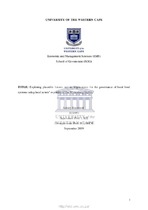Exploring plausible futures and its implications for the governance of local food systems using local actors’ expertise in the Witzenberg region.
Abstract
Despite having a significant agri-food sector, South Africa is faced with strong food security issues related to high inequalities and the legacy of the apartheid regime. The South African food system finds itself at risk of alienating the majority of its citizens from realizing their right to access food granted by the South African Constitution (1996) Section 27(1)(b). Increasing poverty, unemployment and poor governance are making it harder for ordinary South African citizens to put safe and nutritious food on the table. Part of the food security issue in South Africa is that there is an inefficiency in public policies. It can be explained by the extreme segmentation of public action between departments and also by the limitations and ineffectiveness of decentralization resulting in little to no involvement from local governments.
Like most socio-economic issues, the effects of food insecurity are first experienced on the ground at the local level where municipalities are at the forefront. The absence of effective policy around food security and food systems at the local level in South Africa leaves room for research on improved local food governance. Municipalities should be best suited to understand the consequences of food insecurity and could therefore use some of their constitutional mandate which provides some room for manoeuvre with regard to food issues. The aim of this study is to raise awareness of food security issues at the municipal level and to identify ways to facilitate engagement by municipalities. Its main objective was to adopt a foresight approach, using scenarios with local actors, and to understand how it can help improve the engagement of municipalities and citizens in the food security debate and take possible action. This research has made use of an existing collaboration between the Centre of Excellence in Food Security (CoE-FS) and the South African Local Government Association (SALGA) developed in the Western Cape. The collaboration focuses on the understanding of the food policy space in South Africa, the results of existing policies, and how the co-production of knowledge between stakeholders, notably at the local level, can contribute to policy improvement.

